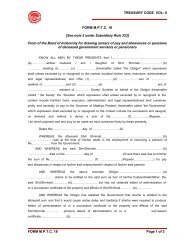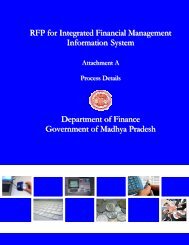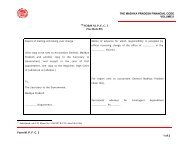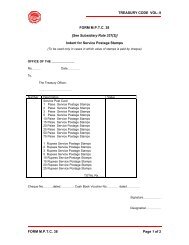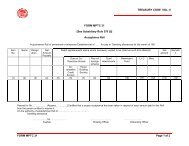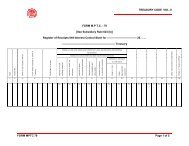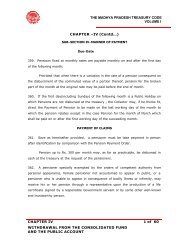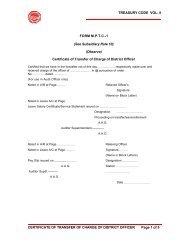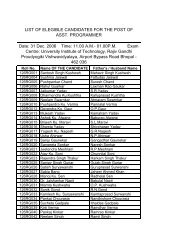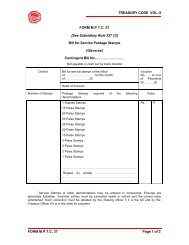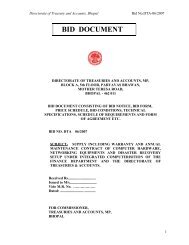THE MADHYA PRADESH TREASURY CODE ... - Mptreasury.org
THE MADHYA PRADESH TREASURY CODE ... - Mptreasury.org
THE MADHYA PRADESH TREASURY CODE ... - Mptreasury.org
You also want an ePaper? Increase the reach of your titles
YUMPU automatically turns print PDFs into web optimized ePapers that Google loves.
<strong>THE</strong> <strong>MADHYA</strong> <strong>PRADESH</strong> <strong>TREASURY</strong> <strong>CODE</strong><br />
VOLUME I<br />
PART II- SUBSIDIARY RULES UNDER <strong>TREASURY</strong> RULES<br />
CHAPTER-I<br />
GENERAL ORGANISATION AND WORKING OF TREASURIES<br />
Section-I General Organisation<br />
MANAGEMENT<br />
1. A list of treasuries and sub-treasuries in Madhya Pradesh is given in Appendix2.<br />
2. (a) Each treasury, the cash business of which is not conducted by the Bank, is<br />
divided into two departments--that of accounts under the charge of an Asstt.<br />
Treasury officer, and that of cash, stamps and opium(if any) under the charge of a<br />
treasurer. Treasuries, the cash business of which is conducted by the Bank, have<br />
no treasurer, and the charge of stamps and opium at such places is held by<br />
clerks(other than Asstt. Treasury Officer) directed by Treasury Officers to hold such<br />
charge.<br />
(b) The two departments should be so located as to work quite independently of<br />
each other during the day; the arrangement should be such that any person having<br />
business to do with the treasury, must first pass into the account office(branch) and<br />
then through the treasurers department.<br />
(c) It is desirable, when the building accommodation allows of it--(1) that the<br />
Treasury Officer's room should have a door leading into the Asstt. Treasury Officer's<br />
room behind a counter which should extend across the room so as to prevent the<br />
public obtaining access into that portion in which the Asstt. Treasury Officer and his<br />
assistants are employed; (2) that the treasureers room should be next to the Asstt.<br />
Treasury Officer's also with a similar counter, with communication (i) for the public<br />
in front of the counter, and(ii) with the Asstt. Treasury Officer by an opening behind<br />
the counter.<br />
COLLECTOR<br />
3. The Collector, as in general charge of the treasury, shall be immediately<br />
responsible to Government for its general administration and working. The<br />
appointment of a subordinate to the immediate charge of a treasury shall in no way<br />
relieve the Collector from responsibility which extends not only to the security of<br />
cash balance, stamps, opium and other Government property, and the immediate<br />
detection of any irregular practice on the part of the subordinates, but also to the<br />
correctness of prescribed accounts and returns and the punctuality of their<br />
submission, and to the implicit obedience of the Treasury Officer to the instructions<br />
issued by the Accountant-General, Currency Officer or other competent authority.<br />
4. The Collector shall send immediate notice to the Accountant-General, Finance<br />
Department of Government and other authorities concerned of any defalcation or<br />
CHAPTER I 1 of 25<br />
GENERAL ORGANISATION AND WORKING OF TREASURIES
<strong>THE</strong> <strong>MADHYA</strong> <strong>PRADESH</strong> <strong>TREASURY</strong> <strong>CODE</strong><br />
VOLUME I<br />
loss of public moneys, stamps or opium and other property discovered in the<br />
treasury or any sub-treasury even when such loss has been made good by the<br />
person responsible for it. Such notice shall be supplemented as soon as possible<br />
afterwards by a detailed report after personal investigation into the case. In dealing<br />
with cases of defalcations or losses as aforesaid and in reporting such cases to the<br />
Accountant-General and other authorities, the Collector shall be guided by such<br />
general orders or instructions as may be issued in this behalf by Government. Petty<br />
cases, that is, cases involving losses not exceeding Rs. 500 each, need not be<br />
reported to the Accountant-General unless there are in any case important features<br />
which merit detailed investigation and consideration.<br />
5. The Collector shall remember that when an irregularity of any kind is brought to<br />
his notice by the Accountant-General, nothing but a report on his own knowledge,<br />
after personal investigation can be considered satisfactory. It is not enough for him<br />
to pass on the explanation of the subordinate inasmuch as reports prepared in this<br />
manner are likely, by lulling suspicion, to lead to greater irregularities afterwards.<br />
6. (1) The duty of verifying and certifying the monthly cash balances and of signing<br />
the monthly cash accounts and plus and minus memoranda may be entrusted to a<br />
senior Deputy Collector not being the officer in charge of the treasury. The duty<br />
must, however, be performed by the Collector himself once in every period of six<br />
months, the verification of the balances being made without giving pervious<br />
intimation as it would help to check defalcation in the treasuries.<br />
Note:- List of payment and its subsidiary schedules sent to the Accountant-General<br />
twice a month should be signed only by the Treasury Officer. The Collector<br />
will, however, remain responsible for the correctness of the accounts.<br />
(2) In addition to the cash balance, the stock of stamp, opium and plain<br />
watermarked paper should also be verified with the balances as shown in the<br />
treasury registers and in the monthly plus and minus memorandum rendered to the<br />
Accountant-General. The Collector or Deputy Collector who verifies cash, stock of<br />
stamps, opium, watermarked paper etc. , should also verify valuables, court<br />
property and other articles lodged with the Treasury for safe custody and certify on<br />
the Register of Valuables prescribed under S.R. 48<br />
7. The verification should be made in accordance with subsidiary rules in Section III<br />
of Chapter III, and should include the balance in the treasurers separate chest as<br />
well as that under double locks. Small amounts of silver, which cannot be verified by<br />
weighing, should be counted in detail. It is not permissible to exclude from the<br />
monthly counting, any part of the cash balance, however, carefully counted. Sealed<br />
and Stored away. The Officer should see that gunny bags of special make and<br />
standard size are used for storing all silver coins, and should satisfy himself that<br />
every bag actually contains the description of coin which it purports to do. He must<br />
also satisfy himself that the orders for ensuring the safe custody of coins are<br />
properly carried out.<br />
8. In verifying the cash balance, the officer should satisfy himself, by personal<br />
examination, that the actual stock of coin, currency notes, etc. , corresponds with<br />
the balances shown in the register of cash under double locks and in the treasurer's<br />
CHAPTER I 2 of 25<br />
GENERAL ORGANISATION AND WORKING OF TREASURIES
<strong>THE</strong> <strong>MADHYA</strong> <strong>PRADESH</strong> <strong>TREASURY</strong> <strong>CODE</strong><br />
VOLUME I<br />
balance sheet; also that the sum held by the treasurer in his separate custody is not<br />
larger than is necessary for the convenient transaction of the Government business,<br />
or larger than the security given by him. The maximum balances to be held by<br />
treasurers under single lock in the district and sub-treasuries are given in Subsidiary<br />
Rule 95. He is also required to verify the stock of drafts and similar forms which are<br />
intended for use in monetary transactions when verifying stamps and opium.<br />
Note:- The word "Stamps" used in this and other rules of this part includes the Match<br />
Excise Banderols.<br />
9. The Collector shall satisfy himself at least once in every quarter that the deposit<br />
registers are kept according to prescribed rules and that all necessary entries are<br />
made and initialed without fail at the time of the transaction.<br />
10. The Collector shall be specially careful, when assuming or relinquishing charge<br />
of a district, to see that the cash balance and stock of stamps, opium's, etc. , in the<br />
treasury are thoroughly verified and that the certificate, in Form M. P. T. C. 1 which<br />
is required from the relieving and relieved officers, showing the treasury balance in<br />
cash, stamps, opium, etc. , is invariably dispatched along with the charge report to<br />
the Accountant-General on the same day that the transfer of charge takes place.<br />
11. The Collector shall report every transfer of the executive charge of a Treasury<br />
by post the same day to the Accountant-General, the Director of Treasuries and<br />
Accounts and the Secretary to the Government in the Finance Department. This shall<br />
be done by forwarding a copy of the Certificate in form M.P.T.C. 1 A signed by the<br />
relieving and relieved Treasury Officers. Before signing the certificate the treasury<br />
officer on assuming or relinquishing charge shall ensure that the cash balance and<br />
stock of stamps, opium, etc., are thoroughly verified.<br />
<strong>TREASURY</strong> OFFICER<br />
12. The appointment of very officers to the charge of treasuries is objectionable,<br />
but if in a temporary emergency such an appointment is made, the departure from<br />
the strict rule should be reported to the Accountant-General and the reasons for it<br />
should be explained to that officer.<br />
13. The charge of treasuries is to be entrusted to Deputy Collector, but may be<br />
combined with such definite charge of magisterial, revenue, municipal, or other<br />
work as may not be incompatible with the efficient performance of the primary duty<br />
of treasury administration. An Assistant Collector must not be placed in charge<br />
except for the purpose of training or as a strictly temporary measure, pending the<br />
arrival of the Deputy Collector, appointed to the post. The officer selected should<br />
have had at least three year's service and must have passed in Accounts by the<br />
higher standard. Every Assistant Collector, or Deputy Collector, shall, until he has<br />
passed in Accounts by the higher standard, be placed, for purposes of training, in<br />
charge of the treasury, under the general supervision of the Deputy Collector<br />
ordinarily in charge, or some other competent officer on the spot, for a period of not<br />
less than six weeks or more than two months in each year. Frequent changes in the<br />
charge of treasuries should be avoided. As far as possible, the same officer should<br />
be kept in charge for the year.<br />
CHAPTER I 3 of 25<br />
GENERAL ORGANISATION AND WORKING OF TREASURIES
<strong>THE</strong> <strong>MADHYA</strong> <strong>PRADESH</strong> <strong>TREASURY</strong> <strong>CODE</strong><br />
VOLUME I<br />
Note:-1- The Condition of three year's service need not, however, be insisted on in<br />
the cases of Deputy Collector who have been promoted from the ranks of Naib-<br />
Tehsildars and Tehsildars.<br />
Note:-2- No re-employed pensioner should be placed in charge of a treasury or subtreasury.<br />
14. As the Collector's delegate and representative, the Treasury Officer is<br />
responsible to the Collector Primarily for the proper discharge of his duties, for<br />
thorough observance of all rules prescribed for his guidance in every branch of his<br />
duties and for strict attention to all details of the daily routine of the treasury work.<br />
He is responsible to the Collector for the working of the treasury and the conduct of<br />
the subordinate treasury officials; and, for the custody of cash balance, stamps and<br />
opium, he is jointly responsible with the treasurer. He must have carefully prepared<br />
instructions for the guidance of every branch of his office.<br />
15. The Treasury Officer is responsible to the Collector for keeping the accounts of<br />
the treasury strictly in accordance with the directions contained in the Account Code,<br />
Vol. II, for the accuracy of all initial records and vouchers and for regularity of all<br />
transactions taking place at the treasury.<br />
16. The special precautions to be observed by the Treasury Officer in matters<br />
relating to receipt, custody and payment of Government moneys are specified in<br />
other relevant chapters of these rules.<br />
A list of some of the matters of treasury procedure in which special personal<br />
intervention of the Treasury Officer is required by the rules is given in Appendix 3.<br />
That list, however, is not exhaustive.<br />
RELATION WITH <strong>THE</strong> ACCOUNTANT-GENERAL<br />
17. The Accountant-General directs his communications regarding treasury accounts<br />
and procedure either to the Collector or to the Treasury Officer, but all important<br />
communications to the Accountant-General must issue over the signature of the<br />
Collector or with his approval. The Collector may not forward the Treasury Officer's<br />
explanation as his own in reply to questions or enquiries concerning the treasury<br />
work.<br />
RELATION WITH <strong>THE</strong> CURRENCY OFFICER<br />
18. The Currency Officer ordinarily directs his communications to the Treasury<br />
Officer but, save in matters of daily routine, all communications to the Currency<br />
Officer must issue over the signature of the Collector or with his approval. The<br />
Currency Officer will bring to the notice of the Collector the cases in which the<br />
Treasury Officer appears to be neglecting his duties.<br />
Note 1 :- The control of the currency, resource and remittance operations of the<br />
Government vests in the Reserve Bank and this work, so far as the treasuries<br />
in this State are concerned, is conducted, under the control of the Bank, by<br />
CHAPTER I 4 of 25<br />
GENERAL ORGANISATION AND WORKING OF TREASURIES
<strong>THE</strong> <strong>MADHYA</strong> <strong>PRADESH</strong> <strong>TREASURY</strong> <strong>CODE</strong><br />
VOLUME I<br />
the Currency Officer in charge of the Issue Department of the Bank at<br />
Bombay.<br />
Note 2:- The procedure to be observed by the Treasury Officer with regard to<br />
custody of currency chests and verifications of currency chest balances is<br />
regulated by the orders embodied in part II, Chapter XII.<br />
TREASURE<br />
19. Detailed rules for the custody of treasure, both specie and notes, are laid down<br />
in Chapter III of part II of these rules.<br />
TREASURER<br />
20. The Treasurer is responsible for the handling of the money at a treasury. It is<br />
the duty of the Collector to see that the Treasurer furnishes adequate security to<br />
protect the Government against loss due to his negligence or fraud.<br />
21. A model form of the Treasurer's security bond is given in Form M. P. T. C. 2.<br />
22. (a) Unless otherwise ordered by Government in any particular case or class of<br />
cases, such security shall consist of promissory notes and stock certificates of the<br />
Central Government or a State Government. Post Office National Savings<br />
Certificates may also be accepted as security deposits for the amount at which the<br />
certificates were purchased( and not for their face value), provided the depositor<br />
formally transfers the certificates, with the sanction of the post-master General, to<br />
the officer who would hold ordinary Government, paper similarly deposited.<br />
Promissory notes should not be accepted as security by Government Officers unless<br />
they have been enforced for payment of interest at the treasuries in which they are<br />
to be deposited. These orders need not be taken as absolute in all cases of deposit.<br />
The Officer who accepts the security should exercise his discretion and need not<br />
require enhancement in petty cases of temporary deposit, or where the depositor is<br />
thoroughly trustworthy and substantial, unless he has reason to suspect the<br />
authority of the promissory note or the depositor's title to it. When there is any<br />
doubt about the regularity of endorsements on the note, the depositor should be<br />
required to obtain a renewal of it in his name.<br />
Note 1:- Investments in the National Plan loan in the form of Government<br />
promissory notes come within the purview of this rule and can therefore be<br />
accepted as security.<br />
Note 2:- The security should be accepted at 5 percent below the market price or at<br />
the face value, whichever is less, and should be dealt with in accordance with<br />
the rules in Chapter IX of the Government Securities Manual.<br />
(b) Securities lodged as deposits may be returned after six months from<br />
the date of vacation of office by a treasurer, but the bond should be<br />
retained permanently, or until it is certain that there is no necessity to<br />
keep it any longer.<br />
CHAPTER I 5 of 25<br />
GENERAL ORGANISATION AND WORKING OF TREASURIES
<strong>THE</strong> <strong>MADHYA</strong> <strong>PRADESH</strong> <strong>TREASURY</strong> <strong>CODE</strong><br />
VOLUME I<br />
(c) The security bonds of all treasurers and of stamp store clerks will be<br />
sent direct to the nearest branch of the State Bank of India for safe<br />
custody.<br />
(d) A Fidelity Guarantee Policy of the Life Insurance Corporation of India<br />
may also be accepted as security from the treasury staff provided<br />
that:-<br />
(i) The Employees take Fidelity Insurance Polices at their own<br />
expense;<br />
(ii) This form of security is not accepted from a private party;<br />
(iii) When the security is furnished in the form of Fidelity Guarantee<br />
Policy the authority who accepts security under S. R. 20 shall<br />
see that the Govt. servant pays the preemie necessary to keep<br />
the policy alive on the due dates. If the Govt. servant fails to<br />
deliver the premium receipt to the said authority in time, he<br />
should be removed from his post at once.<br />
23. The Collector may, at his discretion, accept personal securities from the staff of<br />
the treasuries entrusted with the charge of money in Form M. P. T. C. 3. The<br />
determination of the adequacy of the security is left to him and he is also responsible<br />
for verifying the contained solvency of the sureties once a year.<br />
Where personal security has been furnished, the Collector will send to Director of<br />
Treasuries and Accounts, Madhya Pradesh on the 15th April, of each year a<br />
certificate to the effect that he is satisfied of the continued solvency of all such<br />
sureties.<br />
Note:- Whenever, the Collector under his discretion accepts personal securities under<br />
the above rule, he may also in addition to it, permit the Government servant<br />
to pay the amount of security in suitable monthly instalments. The amount<br />
so paid will be deposited by the Government servant in a post Office Savings<br />
Banks Account, opened in his name provided that the depositor has signed<br />
and delivered to the Post Master a letter in the prescribed form as per post<br />
Office Savings Bank Rules, pledging the account to the Collector of the<br />
district, to the extent of the security fixed. When an amount equal to the<br />
security fixed is thus deposited, it shall be got converted in one of the forms<br />
described in S. R. 22 and the Government servant shall furnish a bond in<br />
Form M. P. T. C. 2. Till these formalities are completed, it shall be ensured<br />
that the personal securities already furnished remain in force, and that the<br />
annual certificate of the continued solvency of the sureties is regularly<br />
furnished.<br />
<strong>TREASURY</strong> RECORDS<br />
23A. Treasury records will be retained for the periods noted against them in the list<br />
given in Appendix 4 -A. The year in which such papers are to be eliminated should be<br />
marked upon them immediately after disposal and before their deposit in the record<br />
CHAPTER I 6 of 25<br />
GENERAL ORGANISATION AND WORKING OF TREASURIES
<strong>THE</strong> <strong>MADHYA</strong> <strong>PRADESH</strong> <strong>TREASURY</strong> <strong>CODE</strong><br />
VOLUME I<br />
room. To ensure that they are regularly eliminated, the record-keeper in whose<br />
custody the records are kept should regularly, in the course of the year, submit<br />
through the Treasury Officer to the Collector a list of records liable to be destroyed.<br />
ASSTT. <strong>TREASURY</strong> OFFICER<br />
24. The Asstt. Treasury Officer is responsible under the orders of the Treasury<br />
Officer for keeping complete records of cash and book transactions of the district and<br />
subordinate treasuries and for the compilation of prescribed accounts and returns<br />
strictly in accordance with the directions and orders in force. He is also required to<br />
see that the rules and orders in force are observed in respect of all transitions of the<br />
treasury and to bring all cases of irregularity to the notice of the Treasury Officer.<br />
25. The Asstt. Treasury Officer may be required to inspect, under the orders of the<br />
Treasury Officer, the account records of s ub-treasuries and to check a percentage of<br />
the initial accounts.<br />
Section II--Treasury Accounts<br />
TREASURER'S RECORDS<br />
26. The treasurer shall maintain a simple cash book(without subordinate<br />
registers) in which each receipt and payment shall be posted at the time and on the<br />
date on which they actually occur and in the order of occurrence. The Treasurer<br />
shall sign and immediately return to the Asstt. Treasury Officer (after the necessary<br />
entry in his accounts) all receipts for money received. He shall stamp all payment<br />
vouchers "Paid" and retain them for delivery to the Account Department when the<br />
books are compared.<br />
27. When stamps or opium have been sold, the total sales shall be entered before<br />
the cash book is closed and a memorandum shall be prepared and forwarded to the<br />
Asstt. Treasury Officer, so that the necessary entry may be made in the accounts.<br />
The Treasurer's cash book shall be totalled on each page and for each day, but there<br />
total should not be carried forward from day to day. The Treasurer must enter in the<br />
cash book in consecutive order all the amounts he receives and post the payments<br />
by the same number and letter which the vouchers bear in the Asstt. Treasury<br />
Officer's cash book and registers, whether they come to him consecutively or not.<br />
In the case of receipts of frequent occurrence such as land revenue, it may be<br />
convenient to enter the items following under the same head in one place in the cash<br />
book. This can be done by setting apart a portion of the day's page or pages at the<br />
commencement of business for the entry of such items.<br />
ASSISTANT <strong>TREASURY</strong> OFFICERS BOOKS<br />
28. The form and procedure with regard to the initial accounts kept in the treasury<br />
and the methods and principles in accordance with which the accounts are kept, are<br />
governed by the Treasury Officer to satisfy himself that those directions are strictly<br />
observed, that the accounts are correct in all respects and that the record of receipts<br />
CHAPTER I 7 of 25<br />
GENERAL ORGANISATION AND WORKING OF TREASURIES
<strong>THE</strong> <strong>MADHYA</strong> <strong>PRADESH</strong> <strong>TREASURY</strong> <strong>CODE</strong><br />
VOLUME I<br />
and payments are so clear, explicit and self-contained as to be producable, if<br />
necessary, as satisfactory and convincing evidence of facts.<br />
Note:- A complete record of cash transactions and book transfers relating to the<br />
district treasury, including those of sub-treasuries within its jurisdiction, swill<br />
be kept in the Asstt. Treasury Officer's cash book. Every item received or<br />
paid as well as all as adjustments by transfer should be entered in the cash<br />
book or in some register subsidiary to the cash book in accordance with the<br />
directions contained in the Account Code. Volume II. The daily total from<br />
each subsidiary register should pass into the cash book.<br />
29. The Treasury Officer shall prohibit any erasures or overwriting in the cash book<br />
and other registers of initial record or in any account or schedule and verify and<br />
initial every correction in them.<br />
SUB-TREASURIES<br />
30. (a) Sub-treasuries are ordinarily situated at the headquarters of tehsils. The<br />
sub-treasury shall be under the general charge of the Sub-Divisional Officer in<br />
charge of the tehsil, while the immediate executive control will be entrusted to the<br />
Tehsildar. (A senior Naib-Tehsildar of a tehsil, who has passed the Departmental<br />
examination in Accounts and has put in a minimum of three year's service is<br />
permitted, if necessary, to be placed in subordinate charge of a sub-treasury subject<br />
to the condition that the Tehsildar continues to be in executive charge of the subtreasury<br />
and the monthly accounts and balances are checked and verified by him. )<br />
(b) The Tehsildar or Naib-Tehsildar as Sub-treasury Officer will be subordinate to and<br />
work under the executive control of the Sub-Divisional Officer who will be ultimately<br />
responsible to the Collector of the district for the proper conduct of the duties and for<br />
the observance of the rules. Sub-Divisional Officer will be responsible for the<br />
punctual submission of monthly accounts and returns to the District Treasury by the<br />
Sub-treasury officer he will also verify personally the cash bodance of the sub<br />
treasury once in six months. His responsibilities in regard to the working of the subtreasury<br />
will be similar to those of the Collector in regard to the working of the<br />
district treasury.<br />
Note:- The sub-treasuries at Sukma and Bhopalpatnam in the Baster district remain<br />
closed during the periods from 7th to 11th from 20th to 24th of each month.<br />
31. In absence of the Tehsildar from the tehsil Headquarters the immediate<br />
executive control of the sub-treasury shall ordinarily be entrusted to the senior most<br />
Naib-Tehsildar, but where there is no Naib-T ehsildar or the Naib-Tehsildar is absent,<br />
the Tehsildar shall make over charge of the sub-treasury to the tehsil official of the<br />
highest standing next to himself. A similar course shall be followed by the Naib-<br />
Tehsildar, if at any time while in charge of the sub-treasury during the absence of<br />
the Tehsildar he is compelled, before the return of that officer, to leave<br />
headquarters. It must only be in cases of emergency that the Tehsildar and Naib-<br />
Tehsildar shall both be absent from headquarters at the same time.<br />
SUB-<strong>TREASURY</strong> ACCOUNTS<br />
CHAPTER I 8 of 25<br />
GENERAL ORGANISATION AND WORKING OF TREASURIES
<strong>THE</strong> <strong>MADHYA</strong> <strong>PRADESH</strong> <strong>TREASURY</strong> <strong>CODE</strong><br />
VOLUME I<br />
32. (a) The daily accounts of sub-treasuries are incorporated in the accounts of the<br />
district treasuries in accordance with the directions contained in the Account Code,<br />
Volume II.<br />
After closing the day's transactions, the Sub-treasury Officer should forward to<br />
the District Treasury Officer, by first post, under certificate of posting, the list of daily<br />
receipts and payments and balance statement with all chalans and payment<br />
vouchers. The list must be sent whether there are transactions or not. In the list<br />
the cash balance of the sub-treasury should be written in words as well as in figures,<br />
the words being written in such a manner as to afford no facility for alteration or<br />
interpolation.<br />
(b) The receipts and payments (after examination) should be posted from it on the<br />
same day or at the latest on the day following the day of their receipt, into the<br />
accounts of the district treasury in the same way as if they had taken place at it. But<br />
they do not pass into the treasurer's cash book.<br />
Note:- If a Treasury Officer owing to the Volume of Sub-Treasury transactions finds<br />
it difficult to scrutinise each and every subsidiary vouchers, he may at his<br />
discretion, leave over the work to the Assistant Treasury Officer and the<br />
concerning Clerk , a percentage check not less then 10% being effected by<br />
him, 40% by the Assistant Treasury Officer and the rest 50% by the<br />
concerning Clerk. All vouchers checked by the Treasury Officer himself must<br />
be initialled by him as a token of the fact that he has exercised the check.<br />
(c) The balance shown in the statement referred to in the preceding rule must be<br />
actually counted and certified by the sub-treasury officer on the closing day of every<br />
month. The form of certificate is printed at the foot of the statement. The daily<br />
sheet for the closing day of the month should also be accompanied by a plus and<br />
minus memorandum of stamps and opium and a certificate of the stamps in store.<br />
(d) When incorporating the sub-treasury accounts, the Asstt. Treasury Officer at<br />
the district treasury must examine the summations, check the payments with the<br />
vouchers and see that the latter are complete in evirg Respect. He must also<br />
compare the opening balance with the closing balance of the previous day both to<br />
see that the balance is correctly brought forward and guard against the accidental<br />
omission of the day's account.<br />
(e) The sub-treasury daily sheets, when entered in the district treasury books,<br />
should be enfaced by the Asstt. Treasury Officer, "Entered in account of (date)",<br />
signed and put away in order. The date of incorporation in the Sadar treasury<br />
accounts of payment vouchers at sub-treasuries should be noted thereon under<br />
initials of the Treasury Officer.<br />
(f) It is the duty of the District Treasury Officer to scrutinised and examine receipts<br />
and payments at sub-treasuries in the same way as those at district treasuries; and<br />
to point and watch against all irregularities. He should also take special precautions<br />
to satisfy himself that Sub-treasury Officer's signature on the daily sheet and<br />
supporting documents is genuine and that the accounts have not been tampered<br />
CHAPTER I 9 of 25<br />
GENERAL ORGANISATION AND WORKING OF TREASURIES
<strong>THE</strong> <strong>MADHYA</strong> <strong>PRADESH</strong> <strong>TREASURY</strong> <strong>CODE</strong><br />
VOLUME I<br />
with in transit. He should examine and regulate the procedure of Sub-treasury<br />
Officers as far as he can from the daily examination of their accounts.<br />
CLOSING FOR <strong>THE</strong> DAY<br />
33. Subject to the directions contained in this behalf in the Account Code, Volume<br />
II, the process of closing accounts for the day shall be as follows:-<br />
(a) The daily total of each subsidiary register will be entered in the appropriate<br />
part of the cash book, which will then be totalled, and the balance memorandum at<br />
the top of the Asstt. Treasury Officer's balance sheet will be drawn up strictly in<br />
accordance with the directions contained in the Account Code, Volume-II. To the<br />
account balance thus brought out, the additions and deductions indicated at the foot<br />
of the cash book form will be applied so as to bring out the cash balance at the<br />
district treasury.<br />
(b) Meantime, the Treasurer will also sum both sides of his cash book and draw up<br />
his balance memorandum in the form of the Treasurer's daily balance sheet (Form M.<br />
P. T. C. 4).<br />
(c) If the results shown in the two balance sheets agree, the treasury Officer<br />
should sign the two cash books and the two balance sheets. He should first satisfy<br />
himself of the correctness and good order of all these documents and should give<br />
special attention to the reconcilement of the account balance of the district with that<br />
actually in the headquarters treasury; the latter excludes the balance in subtreasuries<br />
or under remittance within the district, which the former includes.<br />
(e) The following is memorandum of some of the more important parts of the<br />
verification. The Treasury Officer should---<br />
(i) compare each entry of payment in a register with the payment order,<br />
ticking off each voucher as it is passed. This will not be necessary if the Treasury<br />
Officer adopts the alternative plan of having the account entry presented to him for<br />
initials at the same time that he signs the order of payment;<br />
(ii) examine at least two of the totalling on each side, marking the totals as<br />
"Exd".<br />
(iii) see that the totallings are correctly carried from the register to cash<br />
book, initialling the totals as he thus compares them;<br />
Note--This must done, in the case of receipt registers, even when the total for the<br />
day is blank; but it is not necessary to initial blank payment registers. If the<br />
number of blank receipt registers is great, the following plan may be adopted.<br />
Such registers as are only rarely required for entry may be bound in a single<br />
volume and kept under the Treasury Officer's own lock. When the volume is<br />
required for entry, he should give out the register for the purpose, and he<br />
should receive it back at the time of signing the daily accounts, carefully<br />
seeing in doing so that all new entries in it are correctly carried to the cash<br />
book and initialling them accordingly. It is, obviously necessary to guard<br />
CHAPTER I 10 of 25<br />
GENERAL ORGANISATION AND WORKING OF TREASURIES
<strong>THE</strong> <strong>MADHYA</strong> <strong>PRADESH</strong> <strong>TREASURY</strong> <strong>CODE</strong><br />
VOLUME I<br />
against fraud or mistake of omitting to bring all entries from these registers<br />
upon the cash book; and this precaution is not complete if the Treasury<br />
Officer examines only those registers from which an entry is made upon the<br />
cash book.<br />
(iv) verify the totalling of the cash book or get it done by some principal<br />
subordinate officer, other than the Asstt. Treasury Officer, who should initial it as<br />
correct;<br />
(v) see twice every week that all vouchers are properly arranged.<br />
(e) Before signing the Treasurer' daily balance sheet, the Treasury Officer should<br />
roughly verify the balance in the sole charge of the Treasurer, as shown in that<br />
sheet, and satisfy himself on the following points:--<br />
(i) That no uncurrent coins are left in charge of the Treasurer;<br />
(ii) That no more small silver and copper, bronze and nickel coin is so left than is<br />
actually required for current use;<br />
(iii) That the whole balance in sole charge of the Treasurer never exceeds his current<br />
requirements limited by the amount of his security. Any excess should immediately<br />
be placed under double lock, a certificate to this effect being appended to the<br />
Treasurer's balance sheet.<br />
(f) The Treasury Officer should always be careful to sign the Treasurer's balance<br />
sheet in the evening of the day itself to which it refers, but the signature and<br />
comparison of the Asstt. Treasury Officer's books need not be made till the following<br />
morning unless the office is to be closed for two or more days. The Asstt. Treasury<br />
Officer's balance sheet must not be signed, until it has been carefully agreed with the<br />
Treasurer's<br />
Note:1- Ordinarily, the Treasurer's balance sheet should be compared and agreed<br />
with that of the Asstt. Treasury Officer before closing the treasury for the<br />
day and it is only when pressure of work renders this impossible that the<br />
comparison may be postponed till the following morning. When this is<br />
necessitated the certificate over the Treasury Officer's signature at the foot of<br />
the Treasurer's balance sheet should be altered in manuscript by cancelling<br />
the words" agreed with the Asstt. Treasury Officers daily balance sheet", and<br />
before the form is signed by the Treasury Officer which must be done before<br />
closing for the day. An additional certificate will then be added and signed<br />
by the Treasury Officer in the following morning viz., "agreed with the Asstt.<br />
Treasury Officer's daily balance sheet. " For the 31st March and first few days<br />
of April it will be necessary for the Asstt Treasury Officer to prepare a<br />
separate rough balance sheet on each of these days of comparison with that<br />
of the Treasury as the completion of the Asstt. Treasury Officer's balance<br />
sheet for the 31st March has to await the receipt of the sub-treasury<br />
accounts.<br />
CHAPTER I 11 of 25<br />
GENERAL ORGANISATION AND WORKING OF TREASURIES
<strong>THE</strong> <strong>MADHYA</strong> <strong>PRADESH</strong> <strong>TREASURY</strong> <strong>CODE</strong><br />
VOLUME I<br />
Note:2- It is important that the Treasury Officer should satisfy himself by actual<br />
summation daily that the details of the Treasurer's balance sheet work up to<br />
the grand total and that the resulting total closing balance is correctly arrived<br />
at. In the Asstt. Treasury Officer's balance sheet there is not one figure<br />
which the Treasury Officer has not ample means of verifying; the opening<br />
entries agree with the closing ones of the preceding day; the receipt and<br />
charge are taken from the cash book; the amount shown as sub-treasury<br />
balances can be ascertained in a few moments from the daily sheets of subtreasuries<br />
and any change made since the previous day in the amount under<br />
remittance within the district must be supported by an entry in the subtreasury<br />
sheets, or in the Treasurers cash book. The balance in the district<br />
treasury is shown in the Treasurers balance sheet; and in that part of it which<br />
is under joint locks no change can be made without the active intervention of<br />
the Treasury Officer himself.<br />
(g) The foregoing provisions of this rule apply also to Bank treasuries, subject to<br />
the modification that in the absence of the Treasurer's balance sheet, the correctness<br />
of the daily accounts should be tested by a comparison of the totals of receipts and<br />
payments in the Asstt. Treasury Officer's cash book with the corres ponding totals in<br />
the daily accounts received from the Bank.<br />
Note:- When with the concurrence of the Accountant-General the daily account of<br />
the Bank is submitted to a treasury in the morning of the day following that to which<br />
it refers, the signature and comparison of the Asstt. Treasury Officer's books may be<br />
made in the evening instead of in the morning of the day on which the Bank's<br />
accounts are received, provided the pressure of work renders it necessary so to<br />
postpone it.<br />
34. The accounts of the sub-treasury shall be closed on the last day of the calendar<br />
month including therein all the transactions at the sub-treasury during the month.<br />
The District Treasury shall incorporate the accounts of the sub-treasury in its<br />
monthly accounts.<br />
35. (1) In closing the accounts of the district treasury for the month, the month's<br />
totals of the subsidiary registers will be carried into the cash account in the case of<br />
receipts, and into the list of payments in the case of payments, the cash account<br />
being closed in accordance with the directions contained in the Account Code,<br />
Volume-II. The cash must be verified by actual counting and the cash balance report<br />
made out in accordance with the procedure prescribed in Chapter-III of part-II.<br />
(2) The monthly cash account shall be<br />
subjected to a very careful check by the Treasury Officer when it is laid before him.<br />
He must satisfy himself that the opening and closing balances of this account are not<br />
merely deductions from accounts but are statements of facts certified to have been<br />
verified by actual enumeration of coins and notes. The Treasury Officer shall also<br />
check each entry in the cash account and list of payments with the corresponding<br />
totals in the cash book and see that the totals of all the registers are correctly<br />
carried into the cash book.<br />
Note:- If, at any time, the Treasury Officer be unable to compare all, at least he<br />
may compare some; notably, he should compare the entries in the plus and<br />
CHAPTER I 12 of 25<br />
GENERAL ORGANISATION AND WORKING OF TREASURIES
<strong>THE</strong> <strong>MADHYA</strong> <strong>PRADESH</strong> <strong>TREASURY</strong> <strong>CODE</strong><br />
VOLUME I<br />
minus memorandum of deposits, stamps, etc, with the entries in the account,<br />
e. g. , the plus and minus memorandum shows a reduction in the stock of<br />
judicial stamps to the value of Rs. 5, 000, if the credit in the account be less,<br />
the difference must be traced and satisfactorily accounted for.<br />
MONTHLY ACCOUNTS AND RETURNS<br />
36. (1) A complete list of treasury accounts and returns to be rendered on different<br />
prescribed dates to the Accountant-General, the Currency Officer and other<br />
authorities shall be kept at each treasury. The accounts and returns s hall be written<br />
up in accordance with the directions contained in this behalf in the Account Code,<br />
Volume II, and such orders and instructions as may be issued by the Collector.<br />
(2) Serious notice will be taken of any avoidable delays by the Collector or<br />
Treasury Officer in the despatch of the prescribed accounts and returns with<br />
complete schedules and vouchers, particularly those required by the Government,<br />
the Accountant-General and the Currency Officer concerned.<br />
Note:1- A List of returns, etc. , to be submitted by the Treasury Officer is given in<br />
Appendix 4.<br />
Note:2- The returns due for despatch on a holiday may be sent one day(but not<br />
more than one day) late. " If however, the day on which the returns are to be<br />
sent is a postal holiday, the same may be despatched on the first working day<br />
of the post office after the holiday or holidays.<br />
37. Vouchers pertaining to each schedule relating to the cash account or the list of<br />
payments shall be numbered consecutively in a separate monthly series and kept in<br />
the custody of the Asstt. Treasury Officer, under lock and key in the order of<br />
payment till they are despatched. Before despatch of the list of payments and<br />
schedules, the Treasury Officer shall, by inspection, satisfy himself that the required<br />
vouchers are all attached. He may find it profitable at intervals during the month to<br />
take up a schedule and see that all its vouchers are present in proper order. As no<br />
payment can be made without voucher, there can be no excuse for the absence of<br />
any unless it be that for a specie remittance<br />
CORRECTION OF ACCOUNTS<br />
37-A The rules regarding corrections and alterations in any account register,<br />
schedule, cash book, vouchers, cheques, pay orders, dfrafts, etc. , are contained in<br />
subsidiary rules 29, 53(vi), 121(iii), 146, 162, 165, 709 and 712-Note. Special care<br />
should be taken both by the Treasury Officer and Sub-Treasury Officer as regards all<br />
vouchers and accounts showing signs of alterations and if such documents are<br />
frequently received from any office, the attention of the head of the office should be<br />
formally drawn to the irregularity.<br />
37-B. Treasury figures should never be altered after the accounts have been<br />
rendered to the Account-General . Any error brought to a treasury officer's notice in<br />
time(i. e. , before the submission of the accounts to the Accountant-General) may be<br />
corrected before the accounts are despatched.<br />
CHAPTER I 13 of 25<br />
GENERAL ORGANISATION AND WORKING OF TREASURIES
<strong>THE</strong> <strong>MADHYA</strong> <strong>PRADESH</strong> <strong>TREASURY</strong> <strong>CODE</strong><br />
VOLUME I<br />
37-C. If an error of classification is found after the submission of the accounts to the<br />
Accountant-General, or at the time of comparing the treasury registers with the<br />
departmental returns, a note of it should at once be made against the items affected.<br />
The treasury officer, however, should not make any alteration in the figures in the<br />
registers but should immediately submit an application to the Accountant-General in<br />
Form M. P. T. C. 78-A for necessary transfer. The Accountant-General will inform the<br />
treasury officer of the adjustment when effected and the fact of the transfer having<br />
been made should be noted in the treasury registers on receipt of intimation from<br />
the Accountant-General.<br />
Note:- The erroneous entries in the accounts of any month cannot be corrected by<br />
the Accountant-General in those after they have been closed (which is about<br />
after their receipt), but in such cas es the adjustment of transfer is made in a<br />
subsequent month's account so that the totals for the year up-to-date are<br />
correct.<br />
37-D No corrections of accounts for a past year, so far as concerns the heads of<br />
Government revenue and expenditure, can be admitted later than the 25th May.<br />
37-E. If an error is discovered before the end of the financial year in which it occurs,<br />
which involves a correction of the accounts affecting balance heads(such as deposits,<br />
advances, local funds etc) it is desirable that it should be rectified in the treasury<br />
accounts of a subsequent month by an actual transaction on a refund voucher, which<br />
should be stamped "paid by transfer to credit of. . . . . . . . . . . . . . . . . . . . . . . . . . .<br />
. . . . . . . . . . . . . . . . . . . . . . . . . ". Such a correction may be made (without<br />
reference to the Accountant-General) with the consent of the officer or officers<br />
concerned, but the voucher must state distinctly the nature of the original error and<br />
indicate clearly the authority for its rectification. In case of doubt, a special reference<br />
should be made to the Accountant-General.<br />
If an error is discovered in a balance head after the close of the year, in<br />
which it occurred, it will generally be necessary to effect the adjustment through the<br />
treasury account in the manner indicated in the previous para but such corrections<br />
should never be made without previous sanction of the Accountant-General.<br />
Note:1- (i) The provisions of the above rule(i. e. , corrections by actual<br />
transactions) would not apply to correction of miss-classification under the<br />
head "p-Loans and Advances by the State Government". Such corrections<br />
shall be made by the Accountant-General on receipt of monthly consolidated<br />
requisition for corrections in the form M. P. T. C. 78-A from the treasury<br />
officers.<br />
(ii) For exhibiting in accounts correct figures of payments under the head<br />
mentioned in(i) above, refunds of undisbursed advances, which appear as credits in<br />
the treasury accounts should be shown therein as district items with full particulars<br />
of the original debits.<br />
Section-III-Treasury Inspection . . . . . . . . . .<br />
(1) BY REVEUNE OFFICERS<br />
CHAPTER I 14 of 25<br />
GENERAL ORGANISATION AND WORKING OF TREASURIES
<strong>THE</strong> <strong>MADHYA</strong> <strong>PRADESH</strong> <strong>TREASURY</strong> <strong>CODE</strong><br />
VOLUME I<br />
38. The Commissioners of Divisions shall inspect the Distt. treasuries of their<br />
respective divisions once a year and the sub-treasuries during the course of their<br />
inspection of Sub-Divisions. Similarly, the Director of Treasuries or the Joint Director<br />
of Treasuries and Accounts on behalf of Director of Treasuries shall personally<br />
inspect the District Treasuries at the Divisional Headquarters and the Durg Treasury<br />
once a year and other Distt. Treasuries and sub-treasuries once in 3 years and 6<br />
years, respectively. The inspection shall be directed mainly to matters which are of<br />
importance from the general, administrative and financial points of view. Some of<br />
the important matters which should be seen during inspection are indicated in<br />
Appendix 5. A list of questionnaire for detailed inspection of treasuries and subtreasuries<br />
is contained in appendices 6 and 7. Copies of the inspection report<br />
together with a memorandum showing the action taken thereon shall be forwarded<br />
(1) to the Government in the Finance Department in so far as it relates to any points<br />
of administrative nature on which Government's orders are required; and (2) to the<br />
Accountant-General in so far as it relates to any account and financial matters which<br />
require his attention.<br />
38-A. The regional Joint Directors of Treasuries and Accounts shall conduct detailed<br />
inspections of all the District Treasuries in their Divisions once year positively.<br />
They will also conduct detailed inspection of one third of the sub-treasuries in<br />
their respective regions once a year personally and the rest two thirds shall be<br />
inspected by an Internal Audit Officer of his office once a year. Similarly, every<br />
Treasury Officer shall personally conduct detailed inspection of the sub-treasuries<br />
under him twice a year, during which he shall also ensure that the double lock and<br />
single lock registers have been properly maintained since the date of the last<br />
inspection. The Treasury Officer shall also personally verify the cash, stamp and<br />
valuable articles, etc. , during these inspections.<br />
39. Every Collector shall make a detailed inspection of the Treasury once in six<br />
months and that of the sub-treasury in his district once a year. Besides this, the<br />
stamp depots and the Treasury Strong room shall also be inspected by a Deputy<br />
Collector nominated by the Collector for the purpose once in a month. The Sub-<br />
Divisional Officer in general charge of a sub-treasury shall likewise carryout<br />
inspection of the sub-treasury once in every six months. During these inspections,<br />
the Collector, the Deputy Collector and the Sub-Divisional Officer shall personally<br />
verify the double and single lock registers as well as the valuable articles kept in the<br />
strong rooms of the Treasury/Sub-Treasury, and make suitable entries in the<br />
verification certificate. It shall be the responsibility of these authorities to ensure that<br />
the double and single lock registers have been maintained up-to date from the date<br />
of the last inspection. The primary object of these inspections is to ensure that the<br />
procedure actually observed at the treasuries and sub-treasuries is in accordance<br />
with the rules and orders in all respects and that the accounts and other records are<br />
properly maintained. The inspection shall be carried out in accordance with the<br />
following general instructions:--<br />
(a) The strong-rooms should be first inspected, then the Treasurer's Branch<br />
and lastly the Accounts Branch.<br />
CHAPTER I 15 of 25<br />
GENERAL ORGANISATION AND WORKING OF TREASURIES
<strong>THE</strong> <strong>MADHYA</strong> <strong>PRADESH</strong> <strong>TREASURY</strong> <strong>CODE</strong><br />
VOLUME I<br />
(b) The cash balance should be verified, if not already done in the month<br />
preceding that in which the inspection is held.<br />
(c) The following are some of the more important points to which personal<br />
attention must be devoted at the inspection:--<br />
(i) that the arrangements connected with the strong-room for storage<br />
and custody of treasure, stamps, opium, padlocks and keys and other valuables are<br />
perfect and complete:-<br />
(ii) that cash, draft forms and cheque forms are handled strictly in<br />
accordance with the rules;<br />
(iii) that the arrangements for the examination of money received and<br />
of claims to be paid are satisfactory;<br />
(iv) that the Treasurer has given adequate security and that he has in<br />
addition furnished a security bond in proper form;<br />
(v) that the Treasury Officer/Sub-treasury Officer exercises a proper<br />
and adequate check over the working of the treasury/sub-treasury;<br />
(vi) a general review of the various records, registers, books of<br />
reference, etc. . , . should be undertaken to see whether the detailed orders of<br />
competent authorities, issued since the date of last inspection relating to such<br />
matters as the issue of coins and notes, remittances, custody of padlocks and keys,<br />
stamps and opium, and maintenance of accounts are readily available for reference<br />
and have been properly maintained.<br />
Neither the specification of these points nor the inspection carried out by an<br />
officer of the Indian Audit Department shall in any way diminish the Collector's/Sub-<br />
Divisional Officer's personal responsibility for the efficient working of the<br />
treasury/sub-treasury. As the inspection must be made as systematically and<br />
thoroughly as possible. It is open to the inspecting officer to extend his personal<br />
scrutiny to points not mentioned in this rule, which in his opinion require such<br />
scrutiny.<br />
Note:1- The inspection of his own treasury by a collector is for his own satisfaction<br />
only as he is the officer directly responsible for its proper management. No<br />
copy of his inspection note need ordinarily be submitted to any superior<br />
officer. When inspecting a sub-treasury, he will merely record an inspection<br />
note and send a copy to the Sub-Divisional Officer concerned if, however, any<br />
important defect be detected either by himself or the Sub-Divisional Officer,<br />
the Collector should report the defects to the Director of Treasuries and<br />
Accounts and the Accountant-General separately. The Sub-Divisional Officer<br />
should transmit copies of their inspection memoranda of the sub-treasuries<br />
and under him to the Collector, who will pass such orders on them as may<br />
appear to him to be necessary. The notes recorded in these inspections<br />
should be made available for the inspection of the Accounts Officer at the<br />
time of his inspection of the district treasury and sub-treasuries.<br />
CHAPTER I 16 of 25<br />
GENERAL ORGANISATION AND WORKING OF TREASURIES
<strong>THE</strong> <strong>MADHYA</strong> <strong>PRADESH</strong> <strong>TREASURY</strong> <strong>CODE</strong><br />
VOLUME I<br />
Note:2- The questions to be used in the inspection of district treasuries are given in<br />
appendix 6 and those in the inspection of sub-treasuries in Appendix 7. The<br />
list is not exhaustive.<br />
Note:3- The Treasury Officers/Sub-Divisional Officers/the Regional Joint Directors of<br />
Treasuries and Accounts and the Collectors shall prepare rosteres for the<br />
inspection of the Treasuries/Sub-Treasuries for the whole year in the month<br />
of April each year and submit the same to the Director of Treasuries and<br />
Accounts for approval. The rosters prepared by the Commissioners of<br />
Divisions and the Director of Treasuries and Accounts shall be submitted to<br />
the Government in Finance Department in the month of April each year for<br />
approval. The rosters shall be so prepared that the inspections are carried out<br />
one after the other and in no case, two inspections be carried out at one time.<br />
Each inspecting officer should also ensure that the objections and other<br />
irregularities pointed out by the previous inspecting officer have been set<br />
right by the Treasury/Sub-Treasury Officer concerned and make suitable note<br />
in his inspections report. The inspection by the authorities mentioned in S. R.<br />
38. 38-A and 39 should be conducted in details and in no circumstances<br />
should it be casual or cursory.<br />
(II) BY <strong>THE</strong> INDIAN AUDIT DEPARTMENT<br />
40 The accounts of each district treasury will ordinarily be inspected once in three<br />
years be a gazetted Officer deputed from the Audit Office. A treasury which needs<br />
special attention may, however, be visited more frequently if this is deemed<br />
desirable, and the Accountant-General is authorized, to vary the time table of<br />
inspections as circumstances may require.<br />
A small number of sub-treasuries in which payment are made may also be inspected.<br />
41. The primary object of the inspection is to assist the revenue authorities in<br />
establishing a system of treasury working strictly in accordance with the prescribed<br />
rules.<br />
42. The inspecting officer will see that the procedure observed at treasuries meets<br />
all the requirements of audit, that the accounts are properly maintained and that the<br />
rules regarding the custody and handling of treasure and the control of the balances<br />
are duly observed.<br />
43. The results of the inspection will be set forth in a brief inspection report, which<br />
will be prepared in two parts, one relating to currency, resource and public debt<br />
matters and the other dealing with other points. points of minor importance will be<br />
settled personally on the spot or communicated to the Treasury Officer in the form of<br />
an audit note. The Treasury Officer will be given an opportunity of reading and<br />
discussing the report before it is signed by the inspecting officer and suggesting an<br />
omissions or modifications. If the Collector is present at headquarters, any important<br />
points in the report will be generally discussed with him, if possible.<br />
44 (a) The inspection reports will be forwarded by the Accountant-General to the<br />
Collector of the district concerned in triplicate for necessary action. A copy of part I<br />
CHAPTER I 17 of 25<br />
GENERAL ORGANISATION AND WORKING OF TREASURIES
<strong>THE</strong> <strong>MADHYA</strong> <strong>PRADESH</strong> <strong>TREASURY</strong> <strong>CODE</strong><br />
VOLUME I<br />
will at the same time be forwarded by the Accountant-General to the Currency<br />
Officer, Bombay.<br />
(b) The Collector will pass such order as he considers necessary on the report. He<br />
will then record his remarks is respect of all the irregularities noticed, in one<br />
copy of the report, part I of which will be sent to the Currency Officer,<br />
Bombay, and part II to the Accountant-General, Madhya Pradesh, within five<br />
weeks from the date of receipt of the report in his office. One copy of the<br />
report (both parts I and II), should be forwarded by the Collector with replies<br />
to the Director of Treasuries and Accounts. The Currency Officer will forward<br />
his copy of the report and of the orders thereon to the Accountant-General,<br />
indicating whether, so far as matters dealt with by the Reserve Bank are<br />
concerned, the action taken is adequate or whether any further action is<br />
required.<br />
45. (a) The irregularities in respect of which the Accountant-General considers that<br />
the action taken by the Collector concerned is inadequate will be reported to the<br />
State Government.<br />
(b) Any point of importance affecting the Central Government should be<br />
brought to the notice of that Government through the Comptroller and<br />
Auditor-General of India.<br />
46. The general result of the inspections during the year and the final orders<br />
passed thereon will be summarised by the Accountant-General in a report called "<br />
Annual Review on the Working of Treasuries" , which will be submitted to the State<br />
Government on the 31st May every year.<br />
Section IV - Miscellaneous Provisions<br />
DEPOSIT OF CASH CHEST AND VALUABLES IN <strong>THE</strong> <strong>TREASURY</strong><br />
47. No department may require that funds pertaining to it be received in the<br />
treasury for safe custody and kept out of account, or be received at all, except<br />
under ordinary rules. The following are exceptions to this rule:--<br />
(i) Cash chests or sealed bags belongs to other Government departments<br />
may be lodged in the treasury, or sub-treasury under the orders of the<br />
Collector and when so lodged they should be presented with a slip or<br />
memorandum stating the contents and a receipt should be granted by the<br />
Treasury Officer or the Sub-Treasury Officer, as the case may be, for a bag or<br />
bags, box or boxes, said to contain the amount specified in the slips. The<br />
boxes or bags should be placed, under double lock in the presence of the<br />
officer forwarding the money; or in the presence of his authorised<br />
subordinate, the bages being, if possible, placed in a separate treasure chest,<br />
of which the officer depositing them may be given the key. The Officer<br />
depositing the money for safe custody is entirely responsible for the sum<br />
deposited and such sums will not be brought to account in the treasury or<br />
sub-treasury accounts. The key or keys of the chests should not be kept in<br />
the treasury or sub-treasury.<br />
CHAPTER I 18 of 25<br />
GENERAL ORGANISATION AND WORKING OF TREASURIES
<strong>THE</strong> <strong>MADHYA</strong> <strong>PRADESH</strong> <strong>TREASURY</strong> <strong>CODE</strong><br />
VOLUME I<br />
Note:- Permission of the Collector to keep cash chests in Treasury/Sub-Treasury<br />
shall be required only for the initial deposit and not on every occasion of<br />
deposit of the cash chest. If the cash chests are in operative for three years<br />
from the date of deposit provisions of S. R. 47(ii) will apply.<br />
(ii)<br />
Cash chest/sealed packet lodged in the strong room treasury or a subtreasury<br />
should be taken back by the depositing officer on or before the<br />
expiry of 3 years from the date of its first deposit, thereafter if the depositor<br />
considers it necessary to re-lodge the chest/sealed packet in the treasury or<br />
sub-treasury, he should take necessary action in this respect as in the case of<br />
first deposit. If the chest/packet is not removed even after the period of 3<br />
years, a notice will be served on the depositor by the Treasury/Sub-treasury<br />
Officer for removing the same within a fortnight . If the chest/sealed packet is<br />
not removed even after the period of notice, then the Treasury/Sub-Treasury<br />
Officer should obtain the orders of the authority competent to permit lodging<br />
of such articles in the treasury/Sub-treasury as to the manner in which it<br />
should be disposed of. As far as possible the article should simply be sent to<br />
the depositor or his successor in office through a responsible official or<br />
registered parcel insured for a nominal amount. If the depositor refuses to<br />
accept the article, the chest/packet should be opened and the manner of<br />
disposal decided with reference to the nature of the contents.<br />
Note:1- The Accountant-General should always be informed of the deposits made<br />
under this rule.<br />
Note:2- The Collector is authorised to permit local bodies and courts of wards in the<br />
district to deposit their cash chests in the local treasury for safe custody<br />
subject to the above conditions. The term "Local bodies" includes all<br />
institutions whose funds are reckoned as "Local funds" under Subsidiary Rule<br />
601.<br />
Note:3- The lodgement of the post office balances in safes to be embedded in the<br />
varandahs of Treasuries and sub-Treasuries in cases in which they cannot<br />
conveniently be lodged in police station houses is also permissible, provided<br />
that the conditions laid down in Regulation No. 699 of the Madhya Pradesh<br />
Police Regulations are duly observed.<br />
Note:4 - At places where there are no branches of the State Bank of India, local<br />
Banks which seek permission to keep their iron safes or cash chests and also<br />
sealed packets purporting to contain duplicate keys, for safe custody in the<br />
strong rooms of the districts treasuries and sub-treasuries, may be granted<br />
such permission by the Collector: provided that there is enough space in the<br />
strong room and subject to the fulfilment of the following conditions, viz:---<br />
(A) For iron safes and cash c hests:-<br />
(a) The bank must use strong iron box or safe of moderate dimensions with a<br />
good lock and sealed with a proper seal:<br />
(b) that the treasury authorities must not be harassed by too frequent<br />
applications to open the treasury.<br />
CHAPTER I 19 of 25<br />
GENERAL ORGANISATION AND WORKING OF TREASURIES
<strong>THE</strong> <strong>MADHYA</strong> <strong>PRADESH</strong> <strong>TREASURY</strong> <strong>CODE</strong><br />
VOLUME I<br />
(c) that the bank authorities must keep in their own office the money required<br />
for current needs and only, deposit in the treasury what will not often be<br />
wanted:<br />
(d) that the treasury authorities will not be responsible for the contents of the<br />
box or the cash chest as long as the seals are intact:<br />
(e) that the State Government or any of their officers will not be held<br />
responsible for the loss of the iron safe or cash chest either through<br />
destruction by fire or by theft, fraud or any other cause including negligence<br />
of their s ervants:<br />
(f) that a fee at the flat rate of Rs. 5/- per month or Rs. 60/- per annum for<br />
each iron safe or cash chest shall be charged from the Bank availing of this<br />
facility provided that no such fee shall be levied on the iron safes or cash<br />
chests belonging to the co-operative Banks and societies. The fees thus<br />
realised shall be credited in the treasury under head " XLVI-B- Miscellaneous<br />
other Fees, fines and Forfeitures. " and<br />
(g) that it will be open to Government to withdraw the concession at any time<br />
if any of the above conditions are not fulfilled.<br />
(B) For sealed packets purporting to contain duplicate keys----<br />
(a) The packet should invariably be sealed properly before handing it over to<br />
the treasuries for safe custody; and it should also be accompanied by a<br />
memorandum from the Bank concerned;<br />
(b) the Collector will have the option either to accept or to reject the duplicate<br />
keys of a particular Bank;<br />
(c) the State Government or any of their officers will not be held responsible<br />
for the loss of the sealed packets containing duplicate keys either through<br />
destruction by fire or by theft, fraud or any other cause including negligence<br />
of their servants; and<br />
(d) (i) A flat rate of Rs. (five) only. per pear or a part thereof per packet<br />
irrespective of its size may be charged from the Bank availing of this facility.<br />
The banks will be permitted to withdraw the keys temporarily and no extra<br />
charge will be levied provided the keys are redeposit with the treasury/subtreasury<br />
before the close of business of the day on which they are withdrawn.<br />
(ii) A fee of Re. 1 will be levied if the keys are not redeposited on the day<br />
of their withdrawal but redeposited within 7 days from the date of their<br />
withdrawal.<br />
(iii) If the keys are not redeposited within 7 days of their withdrawal, the<br />
transaction should be treated as a fresh one and the fee of Rs. 5/- as in (d)<br />
(i) above may be levied.<br />
CHAPTER I 20 of 25<br />
GENERAL ORGANISATION AND WORKING OF TREASURIES
<strong>THE</strong> <strong>MADHYA</strong> <strong>PRADESH</strong> <strong>TREASURY</strong> <strong>CODE</strong><br />
VOLUME I<br />
Note:5- The offices of the State Bank of India and its subsidiaries are exempted, on<br />
reciprocal basis, from payment of any fees or charge for the safe deposit of<br />
their duplicate keys with the treasuries and the sub-treasuries.<br />
Note:6- Under the terms and conditions given in Note 4(B), the Madhya Pradesh<br />
Electricity Board is allowed to deposit the duplicate keys of office cash chests<br />
of its various offices in the State for safe custody in treasuries and subtreasuries.<br />
(ii) Bullion jewellery, other valuable, security bonds, etc. coming into<br />
the hands of a Government officer in his official capacity may also be<br />
received in the treasury for safe custody at the discretion of the<br />
Collector, previous permission of the Collector shall not, however, be<br />
required for articles and other valuables to be deposited in the strong<br />
rooms of the treasuries/sub-treasuries for custody by the Courts under<br />
Rule 680 of High Court Rules and Orders (Criminal).<br />
Note--(i) Explosives like firearms, guns etc. , should not be permitted to be<br />
lodged in the treasury/sub-treasury strong rooms;<br />
(ii) Sealed packets containing valuables, etc. , worth less than Rs. 250<br />
each should not be kept by the Courts in the treasury/sub-treasury<br />
strong-rooms. Bullion and jewellery belonging to any Court of ward<br />
estate shall not be received in the treasury for safe custody. Such<br />
articles should be kept by the Officer in-charge of Court of Wards<br />
estate in Bank Lockers under orders of the Collector. The charges for<br />
the Locker shall be borne by the Court of Ward estate funds.<br />
(iii) the terms "other valuable" also include articles like Ganja, Bhang,<br />
opium, Charas, et c. , but these shall be so packed that they do not<br />
emit foul smell during storage in the strong-room.<br />
(iv) A register in a form similar to that prescribed in Rule 48 below<br />
must be kept both in the treasury and sub-treasury in which the<br />
receipt and return of the chests, etc. , should be duly acknowledged.<br />
(v) All licence forms to be granted under the Indian Arms Act, 1878,<br />
should be kept in the treasury under the Treasury Officer's lock until<br />
they are required for use.<br />
Note:- Licence forms under the Indian Arms Act. 1878, may be kept in the Seoni<br />
sub-treasury until they are required for use.<br />
(vi) The fire-proof safe maintained in each district under sections 42<br />
and 43 of the Indian Registration Act, for the custody of valuable<br />
documents like wills. etc. ; should be located in the treasury strongroom.<br />
48. Valuables, etc. , allowed to be kept in the treasury for safe custody under Rule<br />
47(ii) above should be made up in sealed packets and presented with a<br />
CHAPTER I 21 of 25<br />
GENERAL ORGANISATION AND WORKING OF TREASURIES
<strong>THE</strong> <strong>MADHYA</strong> <strong>PRADESH</strong> <strong>TREASURY</strong> <strong>CODE</strong><br />
VOLUME I<br />
memorandum from the depositing officer giving a list of the property contained in<br />
the packet and a statement of their actual or estimated value. The Treasury Officer<br />
or the Sub-treasury Officer, after satisfying himself that the seal is intact, will record<br />
receipt of the packet in a register to be kept in the subjoined form in manuscript.<br />
This register shall be kept in the Treasury/sub-treasury strong room.<br />
REGISTER OF VALUABLES LODGED IN <strong>THE</strong> <strong>TREASURY</strong> FOR SAFE CUSTODY.<br />
Serial<br />
Date of<br />
Office<br />
Circum<br />
List and<br />
Value esti<br />
Initials of<br />
When<br />
Signature<br />
Initials of<br />
No.<br />
of<br />
receipt<br />
from<br />
Stances<br />
descripti<br />
mated or<br />
Treasury<br />
returne<br />
of<br />
Treasury<br />
packet<br />
which<br />
and<br />
on<br />
of<br />
actual<br />
Officer<br />
d<br />
recipient<br />
Officer<br />
or<br />
bag<br />
received<br />
condition<br />
property<br />
and<br />
and<br />
or chest<br />
s<br />
in<br />
said<br />
to<br />
Treasurer<br />
Treasurer<br />
which<br />
be<br />
of<br />
Sub-<br />
or<br />
Sud-<br />
received<br />
containe<br />
treasury<br />
treasury<br />
d in the<br />
Officer<br />
Officer<br />
packet<br />
and<br />
and<br />
Tahsildar<br />
Tahsildar<br />
1 2 3 4 5 6 7 8 9 10<br />
The number assigned to the chest or packet according to the entry in the<br />
register will be noted on it and a receipt will be given in the following form on the<br />
back of the memorandum of contents:--<br />
"No. . . . . . . . . . . . . . . . . . . . . . . . . . . . . . . . . . . . . . . . . . . . . (here give<br />
number assigned to the packet in the register).<br />
Received a sealed packet said to contain the property detailed on the reverse.<br />
A. B.<br />
Treasury Officer<br />
After having signed the receipt, the Treasury Officer will return the<br />
memorandum to the officer presenting the packet. The chests or packet will then be<br />
kept under double lock in the same way as cash and should not be returned without<br />
a written order from the Government servants from whom it was received. The<br />
CHAPTER I 22 of 25<br />
GENERAL ORGANISATION AND WORKING OF TREASURIES
<strong>THE</strong> <strong>MADHYA</strong> <strong>PRADESH</strong> <strong>TREASURY</strong> <strong>CODE</strong><br />
VOLUME I<br />
Treasury Officer should insist upon the return of the original memorandum of<br />
contents receipted by the Treasury Officer before the return of cash chests and<br />
valuables out of sale custody.<br />
Note-1:- The Treasury Officer or Sub-Treasury shall in the month of January of each<br />
year verify the existence of the sealed packets satisfy himself that the seals<br />
are intact and record the fact of verification in the register prescribed in<br />
subsidiary rule 48.<br />
Note-2:- In case the receipt furnished by the Treasury Officer is lost from the<br />
custody of depositor, the depositor should furnish to the Treasury Officer an<br />
indemnity bond which should include the following points:-<br />
1- Certificate regarding the loss of the original receipt;<br />
2- Assurance regarding return of the original receipt to the Treasury<br />
Officer if it is found later on.<br />
3- If in case any other person/officer claims return of sealed packet/cash<br />
box on production of the original receipt later on the person/officer<br />
who received the sealed packet/cash box without producing the receipt<br />
will personally be responsible to the Treasury Officer and the<br />
Government for such act.<br />
Notices<br />
49. Notices should be pasted up conspicuously in the office of the hour at which the<br />
treasury closes for the receipt and payment of money. This hour of closing should be<br />
at least an, hour before the end of day's work, in order to give time for closing and<br />
agreeing the accounts.<br />
Note:- If any local law requires that the treasury on any day should be kept open till<br />
a named hour the accounts cannot, of course, be closed till after that time,<br />
but should then be closed and agreed in the usual manner before any one<br />
leaves office.<br />
CHAPTER I 23 of 25<br />
GENERAL ORGANISATION AND WORKING OF TREASURIES
<strong>THE</strong> <strong>MADHYA</strong> <strong>PRADESH</strong> <strong>TREASURY</strong> <strong>CODE</strong><br />
VOLUME I<br />
50. The hours of business of all Treasuries and Sub-Treasuries for public<br />
transactions are from 11 a. m. to 2 p. m. However, who far as Treasuries and Sub-<br />
Treasuries which deal with the Bank are concerned, the hours of business on a<br />
Saturday are 11 a. m. to 12. 30 p. m. In all cases, on the 10th and the last day of<br />
the month, (or the previous day, if the 10th or the last day be a Sunday or a<br />
Gazetted Holiday), Treasuries and Sub-Treasuries may be closed at 12 noon in order<br />
to give time for closing of the accounts.<br />
Note:1- Treasury business proper(i. e. receipts and payments of money) should not<br />
be suspended on holiday other than those notified under the Negotiable<br />
Instruments Act.<br />
Note:2- The following procedure should be followed for keeping Treasuries and Sub-<br />
Treasuries open, irrespective of holiday in the event of an emergency or an<br />
occasion entailing Mobilizations:--<br />
(i) The Station Commander should make a written request to the<br />
Collector concerned intimating which Treasury/Sub-Treasury is to be<br />
kept open up to four consecutive days from a given date for<br />
transacting military official business only, forward a report of this<br />
action to Army Head Quarters and to intermediate formations; and<br />
also forward to the Secretary to the State Government in the Finance<br />
Department, a copy of his written request to the Collector;<br />
(ii) The Collector receiving the intimation should arrange for the<br />
Treasury/Sub-Treasury to be kept open on the specified dates, or<br />
where Government Treasury work is done by the State Bank of India,<br />
request the Agent to keep the Branch open for transacting military<br />
official business; and<br />
(iii)<br />
Inform the State Government in each case, of the action taken.<br />
( Finance Department Endorsement No. 79-3563-R-VI -III<br />
dated the 22nd January, 1955)<br />
CHAPTER I 24 of 25<br />
GENERAL ORGANISATION AND WORKING OF TREASURIES
<strong>THE</strong> <strong>MADHYA</strong> <strong>PRADESH</strong> <strong>TREASURY</strong> <strong>CODE</strong><br />
VOLUME I<br />
Note:3- The Treasury/Sub-Treasury may be kept open under specific orders of the<br />
Collector to enable Forest, Revenue, Excise etc, Departments, whose cash<br />
chests are kept in the Treasury/Sub-Treasury under S. R. 47, to lodge their<br />
cash chests in the strong room at late hours during departmental auctions.<br />
51. The Treasury Officer shall personally see that the notices which he is required to<br />
exhibit under standing orders or other instructions received from time to time, such<br />
as those regarding the encashment of currency notes, the supply of small silver coin,<br />
nickel and copper, are exhibited conspicuously in places which the public enters<br />
freely and that no favoritism is shown in the conveniences which the treasury can<br />
offer.<br />
Note:- Notices regarding financial matters which may in any way commit the<br />
Government with the public, other than those issued by the Revenue or other<br />
departments with which the Currency Officer is not concerned, should not be<br />
exhibited in any treasury unless its form is previously approved by the<br />
Currency Officer.<br />
CHAPTER I 25 of 25<br />
GENERAL ORGANISATION AND WORKING OF TREASURIES


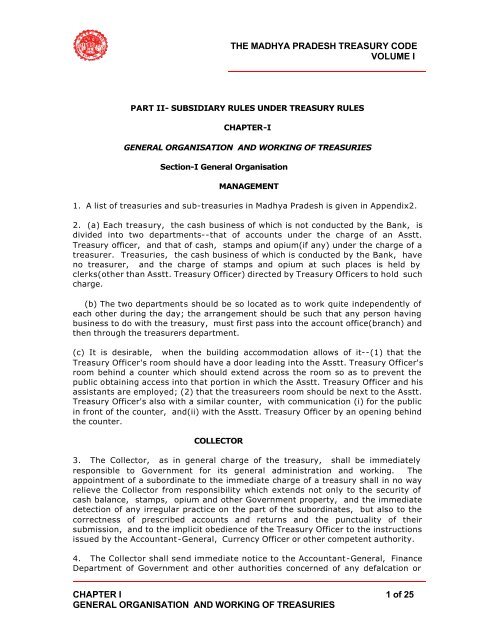
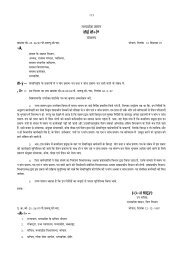
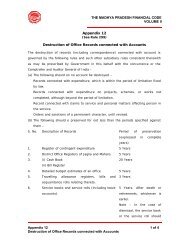
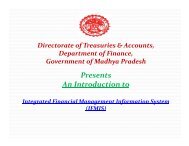
![Form M.P.F.C. 20 [See Rule 266 (4)] - Mptreasury.org](https://img.yumpu.com/50367893/1/190x146/form-mpfc-20-see-rule-266-4-mptreasuryorg.jpg?quality=85)
